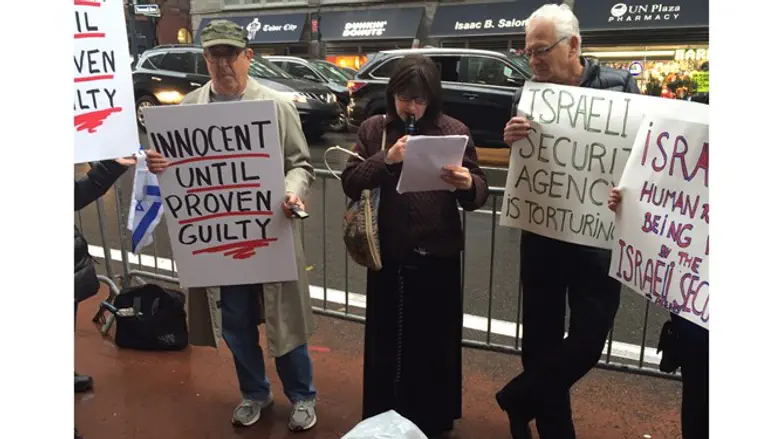
The State Prosecutor’s Office exerted heavy pressure on Elisha O. who was an alleged accomplice in the 2015 Duma arson, to agree to a plea bargain. The hearing is scheduled for May 12.
According to this plea deal, he will admit to having been involved in planning the arson in the Arab town of Duma. In exchange, he will be convicted of reduced offenses. His confession might incriminate another suspect, Amiram ben Uliel, who has consistently maintained his innocence.
The court is basing their evidence upon testimony which was disqualified after it was found to be forced under prolonged torture and extreme duress.
Michoel Fuah, one of the administrators of the Facebook page, The Duma Blood Libel, (Hebrew name: עלילת-דומא) has published the following article by Ruth Gavison regarding the torture of the suspects in what has become known as the Duma blood libel. (Ruth Gavison is one of Israel's leading intellectuals and a renowned Israeli Law professor at the Hebrew University of Jerusalem who holds the chair for Human Rights and whose areas of research include Ethnic Conflict, the Protection of Minorities, Human Rights, Political Theory, Judiciary Law, Religion and Politics, and Israel as a Jewish and democratic state.)
She writes:
”We presently find ourselves at a critical juncture in the Duma blood libel. Not only is the issue of torture under examination, but also the question of the proposed plea deal.
“This proposed plea deal is a form of criminal extortion. The State Attorney's Office is pressuring the family of Elisha O. to accept this plea deal with the unrelenting coercive pressure of the court. While accepting a plea deal will save time in the courtroom, it is inherently dishonest and is a distortion of the legal process. The prosecution has all the time and all means to pressure the defendant indefinitely to confess to the most serious charges. The defendant, on the other hand, does not have the financial or emotional means to wage a costly and lengthy legal battle to prove his innocence.
“The defendant also knows that there are quite a few issues in which the court does not rule on evidence. In these cases, defendants often admit to crimes they did not commit just to finally end the tortuous saga of a powerful legal system. And even if he does accept the plea deal, he knows that he is not guaranteed to be found innocent.
“In the case of the Duma arson, the situation is much worse. The State Prosecutor's Office insists on including the minor's confession in the plea bargain, even though the minor's confession in this matter was rejected in a higher court due to the fact that it was elicited under torture. The goal of the prosecutor's office is clear. They want to achieve the admission of guilt by a Jewish youth in the Duma case by ANY means possible. They want to remove the dark stain that hangs over all the high level officials and legal bodies in Israel involved in this fraudulent case.”
We be interested in hearing Ruth Gavison's opinion on another subject as well. Is it correct to allow plea bargains in criminal cases? Is it in the public interest to allow the State Prosecutor's Office to extort confessions from defendants whose innocence seems likely, thereby enabling the real perpetrators to roam at leisure? (In this particular case, the evidence strongly points to Arabs in the village having committed the arson as part of a prolonged family feud which involved numerous Arab arsons against the Dawabshe family).
It would be fitting that the State Prosecutor's Office close this case, which is based on confessions and reconstructions that were collected in improper ways, and did not produce any concrete evidence. The policy of trumped up charges against innocent people must end!
https://m.facebook.com/story.php?story_fbid=1019019781501764&id=960177554052654
Addendum:
The plea bargain itself: The minor will plead guilty to three counts of price tag and conspiracy to arson, but the amended indictment disconnects the minor from the incident in the village of Duma, and does not mention the name of the main defendant Amiram Ben Uriel.
This is a translation of the letter Elisha's parents sent to friends:
Dear Friends,
By now I imagine that you have heard that we accepted the plea bargain offered to us. It was with tremendous discussion, deliberation and great qualms that we decided to accept the offer.
Two principles guided us. The first being the ability to put this saga behind us and allow Elisha, full rehabilitation and to move on with his life.
The second was that the plea bargain would not compromise any other defendant.
We pray that these goals will be achieved.
In addition, we did not agree to admit that Elisha is part of a terrorist organization. Therefore it will be decided by the court.
We deeply appreciate your prayers, care and support throughout.
In an imperfect world one must look forward and have Emunah that a better future lies ahead of us.
This is not the end and we have little control over the final verdict so we continue to pray for help from Hashem.
With great appreciation,
N.